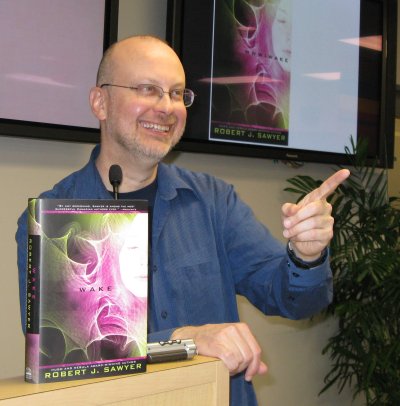Authors@Google: Robert J. Sawyer


Now available on YouTube: my full 1 hour and 12 minute talk given at Google Waterloo on Wednesday, May 27, 2009. Wake up, Watch it, and Wonder about it ... ;)
(If you prefer an audio podcast, you can get that here.)
Visit The Robert J. Sawyer Web Site
and WakeWatchWonder.com



10 Comments:
Robert,
As a loyal fan, and on behalf of Google Waterloo and Google as a whole, let me extend my very sincere thank you for your time, your insightful talk, and your very interesting and entertaining perspectives on the future. We all eagerly anticipate more enjoyable work and interactions with you. We will let you know the first time we see a strong indication of emerging consciousness appear in our logs!
All the best,
Steven Woods
Google Waterloo
For this to happen, the brain of the Web should be somewhere....any idea of the best place for this to happen? Do you think the goverment could be behind it?
-tony
describe at length in WAKE and its sequels how and where consciousness is physically instantiated on the Web. :)
Very interesting lecture! You speak very well. Some thoughts:
Haha, yeah, you'd think the machines in The Matrix would've come up with nuclear power after the sun was blotted out.
When my dog was young he used to growl at his evil twin in the mirror, but then one day I caught what looked to me to be him testing his mirror image to see if it would follow him. He'd move in one direction quickly keeping an eye on his image. He certainly appeared to know the image was of him. I guess he couldn't have though.
I agree completely that there is no reason to think an artificial intelligence would wish us any ill will.
I see your point about consciousness needing an Annie Sullivan, but if the web has access to, say, all these psych journals talking about what consciousness is, I don't see why they couldn't serve as the prompt to make the web self aware as well as any direct interaction.
I will get the book tomorrow!
I think you might like this article about "chemical reactions".
http://www.physorg.com/news164629201.html
(PhysOrg.com) -- While information technology is generally thought to require electrons or photons for transmitting information, scientists have recently demonstrated a third method of transmission: chemical reactions. Based on a flammable “infofuse,” the new system combines information technology and chemistry into a new area the researchers call "infochemistry."
The Snake wrote, "if the web has access to, say, all these psych journals talking about what consciousness is, I don't see why they couldn't serve as the prompt to make the web self aware as well as any direct interaction."
That's a mighty big "if," Snake. If I may quote from the review of my novel WAKE at SF Site (since it addresses this very point): "Now, the idea of a digital intelligence forming online is not a new one, by any means. But I daresay most of the people tackling such a concept automatically assumed, as I always did, that such a being would not only have access to the shared data of the Internet, but the conceptual groundings needed to understand it. And that's where Robert J. Sawyer turns this into such a fascinating, satisfying piece. In a deliberate parallel to the story of Helen Keller, he tackles the need for building a common base of understanding, before unleashing an education creation upon the Web's vast storehouse of knowledge." (You can read the full review here, or, of course, actually read my book for a much fuller discussion of this issue.
(To put it another way, what you're proposing is a bit like saying, gee, all you have to do is put a baby in a room with a copy of the Encyclopaedia Britannica, and just let it absorb all that -- without first teaching it how, or even why, to read.)
The web would have billions of labeled pictures, youtube videos, maybe some audio/visual instructions on how to do things though. And people sharing this stuff with each other all the time. I'm just thinking though. I really have no idea what I'm talking about at all.
I'm reminded of that episode of ST:TNG with a consciousness (I think) that emerges from the holodeck. Picard says if it has access to all our hopes and dreams, shouldn't the sum of those things be a consciousness we have nothing to fear from? Or something like that. Anyway, I don't quite think I have the same faith in a consciousness from youtube. :)
The video was incredible! Too many topics to discuss in only a couple of hours. Next time you should also invite a priest and a psychologist to give you their opinions!!!
-2501
I just finished WWW: Wake, so of course I wanted to check for sequel(s). So using the the search "Robert J. Sawyer www: wake sequel" the first site offered was this post for Authors@Google including the youtube link.
Well with introduction of how and why I got here out of the way... I just wanted to say that I enjoyed the book(hopefully apparent since I came looking for more) and will be waiting for the future installments.
In particular I liked the down-to-earth or more like real world humor of the book. Which begs the first question(s): Having stated in the video that your books sell internationally do they translate well? I mean iPod and eyePod is a very English specific word play. Do they end up bombing like they did for Caitlin in Japan? Or do you depend on the pervasiveness of the English language and English object names(iPod)?
That humor and various topics within the book seemed to show up in my life over the course that I was reading the book. For instance being a recent grad in computer science I visited (bringing my partially read copy of WWW: Wake with me) San Jose for a job interview with a company involved in networking technology. Being in San Jose I decided to stay an extra day so that I could go to The Tech Museum of Innovation. Obviously there was the section on the internet so there were many connections there. However, the prior night I had read past the part where Dr. Kuroda described his favorite cartoon and I happened to see it printed on shirts being sold in the gift shop.
Well guess I should stop here before I start discussing too many things from the book.
Hi, Kyle. If I thought too much about how my books would translate into other languages, I'd be straightjacketed, never using a pun or even a particularly nice bit of phrasing -- both of which would be lost in the translation, of course. So, I simply have to trust that my translators -- all of whom are paid professionals and highly skilled at their jobs -- manage to figure out ways to deal with these things. I've seen them do everything from footnotes, to adding a line to the bgook such as, "Kuroda smiled, getting the pun; the two words sounded the same in English."
Many, many thanks for your kind words!
Cheers,
Rob
Post a Comment
<< Home